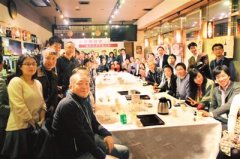Chinese Coffee Bean Market Nestle Coffee Center stationed in Pu'er Industrial Park
After nearly 30 years of deep cultivation of Pu'er, the large-scale project of "Nestle Coffee Center" has recently officially entered the Pu'er Industrial Park. The center will greatly enhance its ability to provide training and technical support to farmers and coffee practitioners, and further improve and promote the development of Pu'er coffee industry. Representatives of Pu'er Industrial Park and Nestle Company jointly signed a cooperation agreement in Pu'er.

Nestl é's pioneering role in Yunnan
Nestl é's activities in Yunnan have had a profound impact on the development of coffee in the region, and a coffee producing area with low yield and low quality has developed into a coffee producing area with high yield, high quality and has attracted the attention of the global coffee industry. More than 20 years after Nestl é entered the region, Yunnan has developed a booming and profitable producing area of high-quality small-seed coffee beans from a traditional tea-growing area.
The purpose of Nestl é in helping Yunnan to develop coffee bean production is to ensure that the company can purchase high quality coffee beans for Nestle coffee production. Now, Nestl é has become a stable, reliable and fair buyer of Yunnan coffee beans, helping to achieve economic prosperity in Pu'er area of Yunnan Province.
Nestl é has been committed to ensuring that coffee beans produced by farmers can meet Nestle's quality standards. In the process of achieving this goal, Nestle's technical assistance and training are the key factors for success, promoting the overall development of the coffee growing area in Pu'er City, Yunnan Province. Although Yunnan has an ideal coffee-growing climate, Nestl é is committed to maximizing coffee production and crop value in the region. In order to achieve this goal, Nestl é not only taught advanced and sustainable cultivation methods in the region, but also introduced new high-yielding small-grain coffee varieties to the region.
Nestle Coffee Center
Enter the park and step into a new level.
Mr. Shi Mingde, Executive Vice President of Nestl é Greater China, said: "since taking root in Yunnan in 1988, Nestl é has been contributing to the vigorous development of the local coffee industry in the spirit of creating shared value. While promoting the development of the local economy, it has also opened up a good coffee planting base for enterprises and industries, and achieved win-win results. Today, the official arrival of the Nestle Coffee Center in Pu'er Industrial Park further proves that this cooperative relationship has entered a new level, and we are full of confidence in the future. "
At the signing ceremony, Mr. Lu Han, director of the Pu'er Coffee Office, presented the "Pu'er Coffee Outstanding contribution Award" to Mr. Hute, General Manager of Nestl é Pu'er Coffee Purchasing Station. He is commended for his great contribution to driving farmers to promote the sustainable development of Pu'er coffee industry in Pu'er in the past 10 years. Hute will be transferred to the Asian and African region on January 1, 2015 to be responsible for the coordination of the Nestle Coffee Project, including Pu'er. Hute's job will be taken over by Mr. Kong Zanlong of Nestl é Mexico Market.
Nestle Coffee Center
Designed to provide international standard testing
The Nestle Coffee Center consists of two parts. One part is Nestle coffee cultivation training, and the center will provide training for farmers, agronomists and coffee professionals, becoming the largest coffee training base of its kind in China; the other part is the modern coffee quality assurance laboratory and integrated treatment and storage facilities. With the increase in coffee bean production in Pu'er City, the configuration will provide much-needed infrastructure and establish local high-quality procurement and testing benchmarks based on international standards.
4C is a widely accepted management rule in the world, which involves the sustainable development of all aspects of the supply chain, such as coffee cultivation, production, processing and marketing, aiming at promoting the sustainable development of coffee production, processing and trade. More and more international coffee buyers require that the coffee they buy must meet the requirements of 4C or equivalent. In the coffee bean purchasing season of 2012-2013, more than 1 of the coffee beans purchased by Nestl é Pu'er purchasing station have met the 4C standard and are mainly exported to the international market. At the same time, in order to encourage farmers to produce high-quality coffee in a sustainable way, Nestl é has set up a "4C incentive to create shared value Fund" since 2013. Mr. Hute, head of Nestl é 'Yunnan Coffee expert Group, said: "in order to ensure the smooth development of the 2014-2015 purchasing season, Nestle's Pu'er agronomic service team has invested a great deal of time and energy in training and visiting farmers. Do your best to help local farmers and coffee growers achieve 4C certification. In the 2014-2015 purchasing season, Nestl é fulfilled its previous commitment to purchase 4C certified coffee beans at 100%. In this way, on the one hand, it can help them tap their production potential, improve coffee quality and increase their income; on the other hand, it will help Yunnan's coffee planting industry to improve the basic management of the coffee growing industry from the social, environmental and economic aspects of the 4C management principles, and to carry out coffee cultivation in a sustainable way. "
Important Notice :
前街咖啡 FrontStreet Coffee has moved to new addredd:
FrontStreet Coffee Address: 315,Donghua East Road,GuangZhou
Tel:020 38364473
- Prev

Korean coffee brand COFFEA COFFEE landed in Kunming
Korean coffee brand COFFEA COFFEE Kunming media tasting meeting Korean coffee brand COFFEA COFFEE Kunming media tasting meeting Korean coffee brand COFFEA COFFEE Kunming media tasting conference Yunnan (Reporter he Yanjie) Korean professional coffee brand COFFEA held a media tasting meeting in Xishan Wanda Square on the 22nd of this month, on the same day Aeropress barista contest champion Mr.Q came in person.
- Next

The "China-Japan Cafe", a smart crowdfunding cafe co-founded by Japanese and Chinese.
A (Zhao Song) China-Japan Cafe, a smart crowdfunding cafe co-founded by a number of Chinese in Japan, officially opened in Tokyo, Japan on December 21. On the opening day, nearly 100 Japanese Chinese gathered in the cafe to hold opening ceremonies and seminars. According to the founder, this is the first intelligent crowdfunding cafe set up by Chinese overseas to expand the international market for all kinds of start-ups.
Related
- Can I make coffee a second time in an Italian hand-brewed mocha pot? Why can't coffee be brewed several times like tea leaves?
- Hand-brewed coffee flows with a knife and a tornado. How to brew it? What is the proportion of grinding water and water temperature divided into?
- What is the difference between Indonesian Sumatra Mantinin coffee and gold Mantinin? How to distinguish between real and fake golden Mantelin coffee?
- What does bypass mean in coffee? Why can hand-brewed coffee and water make it better?
- Unexpected! Ruixing Telunsu lattes use a smoothie machine to foam milk?!
- % Arabia's first store in Henan opens into the village?! Netizen: Thought it was P's
- Does an authentic standard mocha coffee recipe use chocolate sauce or powder? Mocha Latte/Dirty Coffee/Salty Mocha Coffee Recipe Share!
- What is the difference between Vietnam egg coffee and Norway egg coffee? Hand-brewed single product coffee filter paper filter cloth filter flat solution!
- What is the difference between sun-cured and honey-treated coffee? What are the differences in the flavor characteristics of sun-honey coffee?
- How to make Italian latte! How much milk does a standard latte use/what should the ratio of coffee to milk be?

